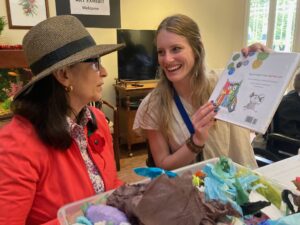The daily memory care meeting opens up one senior living resident’s world.
Jerry was a bit aloof when he first arrived at AlmaVia of San Francisco in 2012. The 93-year-old didn’t like to socialize. He didn’t say much, and he tended to keep to himself.
That didn’t deter Resident Assistant Ronnie Dickens, who leads the community’s daily morning meeting for residents living in AlmaVia of San Francisco’s memory care neighborhood. He’s accustomed to meeting people who aren’t immediately comfortable engaging with others. He started inviting Jerry to the 30-minute daily briefing.
The meeting typically starts with residents introducing themselves and talking about how they’re feeling, then Dickens takes over. He shares the date and weather report, a listing of resident and celebrity birthdays, a printout of international and national news, the lunch and dinner menus and daily activity highlights. The session ends with a poem, morning prayers and a sing-along.
Part of Memory Care Best Practices
The morning meeting is more than a chance for residents to get information, it is a critical part of Elder Care Alliance’s memory care best practices, says Resident Care Director, Leondra Banuelos.
These meetings are largely for residents in the early stages of dementia—those seniors who retain some short- and long-term memory and are fairly independent. Getting the day’s news grounds residents in the present, reducing anxiety and keeping them engaged, Banuelos says.
Most seniors who participate in the morning meetings actually convene earlier in the day for coffee and breakfast together. They arrive at the meetings in a good mood, cracking jokes and bantering back and forth.
Initially Jerry resisted Dickens’ daily invitations to join the group. The senior, while mobile, has a limited ability to read and tends to mumble. Eventually Dickens’ good-natured invites won Jerry over, and he started attending the meetings—even reading from a songbook. “He sings songs such as ‘California, Here I Come,’ ‘You are My Sunshine’ and other tunes popular with his generation,” Dickens says.
Jerry has become sunnier and started talking to other residents. “He’ll talk about different parts of his life, things he doesn’t mind sharing,” Dickens says. “It promotes conversation.”
Banuelos believes morning meetings, along with other arts-related activities and exercise, make a significant difference and help seniors thrive in the community. “We really see that the residents don’t decline as rapidly,” she says. In fact, when she meets with colleagues to discuss memory-care issues related to the residents, there’s often little to talk about. Most residents are sleeping and eating well with few health care-related issues that would require hospitalization.
Health Benefits of the Program
Memory-care focused on engaging seniors with the present and with each other works. Communities with engagement focused programming, such as AlmaVia of San Francisco, tend to have fewer falls, hospitalizations and emergency calls to 911 than their assisted-living counterparts, Banuelos says.
Jerry is living proof. He continues to do well at AlmaVia of San Francisco in large part due to those morning meetings.
“It gets him started, alert, ready for the rest of the day, which includes exercises with a therapist,” says Dickens. “The morning meeting has been life-changing for Jerry. It’s a part of his day, his routine. He’s a jokester, a lot more energetic, not so in his shell anymore. He’s not as shy.”
Those encouraging outcomes thrill the staff. “We love it. We’re happy. It helps us to bond with the residents, and we become friends,” Banuelos says. “It’s fun to come to work. People are fulfilled, happy, healthy. That’s what the program does.”
These morning meetings are a part of the comprehensive memory care programs offered at all Elder Care Alliance communities. Learn more about Elder Care Alliance memory care services.




















